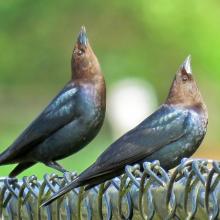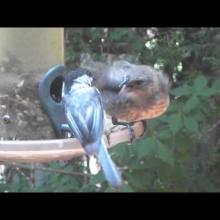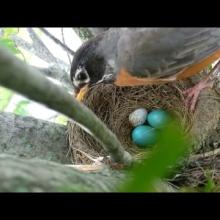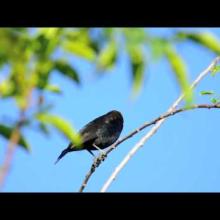

Join BirdNote tomorrow, November 30th!
Illustrator David Sibley and actor H. Jon Benjamin will face off in the bird illustration battle of the century during BirdNote's Year-end Celebration and Auction!
You may have heard the story of the Brown-headed Cowbird evolving its habit of "nest parasitism," due to the bison, wandering the prairies. BirdNote science advisor, Dennis Paulson, has a different take on the matter. He writes
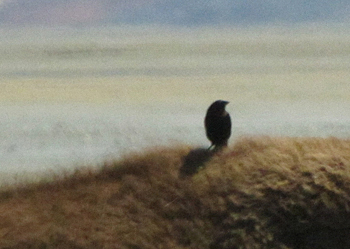
The bison story obviously has great currency, as I’ve heard it from several sources, and it’s obviously well ensconced, at least in the popular literature. But to set the record straight: Cowbirds didn’t evolve a brood parasitic habit because they are too lazy to raise their own kids or they enjoy the thought of reducing the populations of other perching birds. And cowbirds did not evolve brood parasitism because they followed herds of bison. (Yes, they associated with bison, just as they do with cows and horses now, but it was only on the Great Plains.) They spring from a group of blackbirds that almost surely originated in South America and spread northward through the Americas. There are no bison anywhere down there, and some cowbird species live in rain forest, where there are no herds of anything to follow.
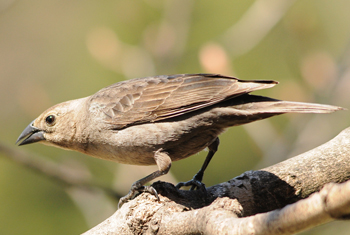
Home, home on the range…?
None of the species of cowbirds follow large animals except on a very local scale. Laying eggs in the nests of other birds would be very difficult under the bison scenario, as one of the things a female cowbird has to do is to find the nests of other species, and that is a lengthy and presumably somewhat difficult process, taking a lot of time on the part of the female. It also has to be done only on nests with clutches that aren’t complete and so aren’t yet guarded by the female that laid the eggs. A cowbird on the move couldn’t possibly time her daily maturation of a single egg with the good luck of finding a nest while she was traveling. “Oh boy, there’s a perfect nest over there. Oops, gotta move – my buffalo is leaving.”
If you look at what we know about them, the female cowbirds are much more sedentary than the bison scenario would expect. They stay in a relatively limited home range and are excellent nest finders only because they know what’s going on in that home range. They have to follow females around and find where they are nesting, then they have to check those nests, presumably daily, to see if an egg has been laid yet. I call cowbirds “superb birders” because of that skill. Male cowbirds are also quite territorial, nothing about them indicating they defend territories or females on the run.
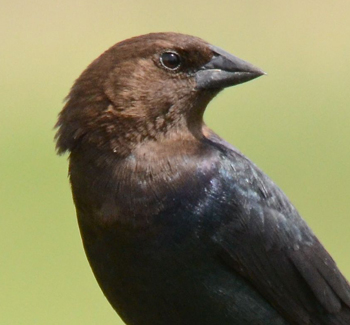
Then how did it come about?
Brown-headed Cowbirds evolved this brood parasite habit because natural selection favored this unique form of reproduction. What’s interesting is that relatively few birds have evolved this, although more than you might think. Brood parasitism has evolved independently in a half-dozen different bird groups, but totaling a rather small number of species. For this to evolve in the first place, there probably has to be a situation in which female birds that lay eggs in the nests of other species do better right away than those that incubate their own eggs and raise their own young. Some of it probably evolved from conspecific brood parasitism, in which birds lay eggs in other nests of their own species. This makes sense (you’ve heard “Don’t put all your eggs in one basket”), and if they extend it to other species that, say, have similar nests and live in the same habitat, that might work, too. We don’t know, however, why brood parasitism evolved just in the groups in which it occurs.
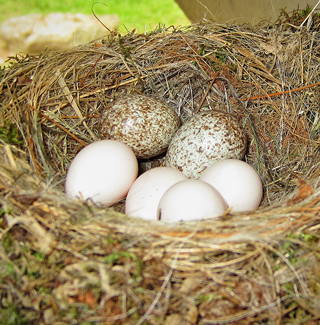
Fast forward to the present
Because a female Brown-headed Cowbird can lay 25 or so eggs in a half-dozen clutches over the season, it’s easy to see why that could be favored by natural selection.
We have favored cowbirds by opening up the landscape, providing them with cows and horses in lieu of the bison they often associated with and having feed lots and crops where they can feed to their heart’s content in winter. They almost surely didn’t have such pronounced effects on their hosts until we came along, sometimes a combination of our own actions reducing the host populations as well as enhancing those of the cowbirds. Shiny Cowbirds invaded Puerto Rico from the east, presumably because we made things better for them along the way, and then proceeded to have negative effects on the already rare Yellow-shouldered Blackbird, which had never had to evolve ways to cope with them. Et cetera.
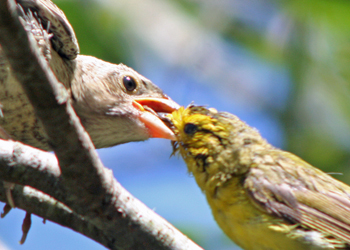
"OK, it's not their fault, but I still don't like them!"
Of course, many of the people who don’t like cowbirds have that attitude because they really can reduce populations of small songbirds, especially if they are already uncommon, e.g., Kirtland’s Warbler, Black-capped Vireo, southwestern Willow Flycatcher, etc.
The Yellow Warbler is something special in the “arms race” between parasite and host (listen to the story.) There are lots of other small passerines that are parasitized by cowbirds that haven’t evolved the counter-strategy of roofing over the eggs, as Yellow Warblers may do. But plenty of the warblers get parasitized anyway. There are passerines that can easily remove the cowbird eggs (egg ejectors) because they have a large bill, birds such as robins, shrikes, kingbirds, thrashers, and jays. But blackbirds, which might be able to do so, don’t – except many Bullock’s Orioles pierce the cowbird eggs to remove them from their nests, even though they couldn’t hold on to the egg in any other way. And so do Marsh Wrens!
What to do, what to do?
My attitude toward the Brown-headed Cowbird is that it’s just fine that they are a part of our environment until it turns out that some endangered species or population is being hammered by them, and then I think it’s perfectly appropriate that we begin to consider cowbird control as part of our management strategies. Wherever we are involved in affecting organisms negatively, we have a responsibility to come up with ways to help them recover.
###
Photos as follows:
Brown-headed Cowbird on bison - Bryant Olsen
Female Brown-headed Cowbird - Putneypics
Male Brown-headed Cowbird - Eugene Beckes
Wilson's Warbler feeding cowbird - Jamie Chavez


